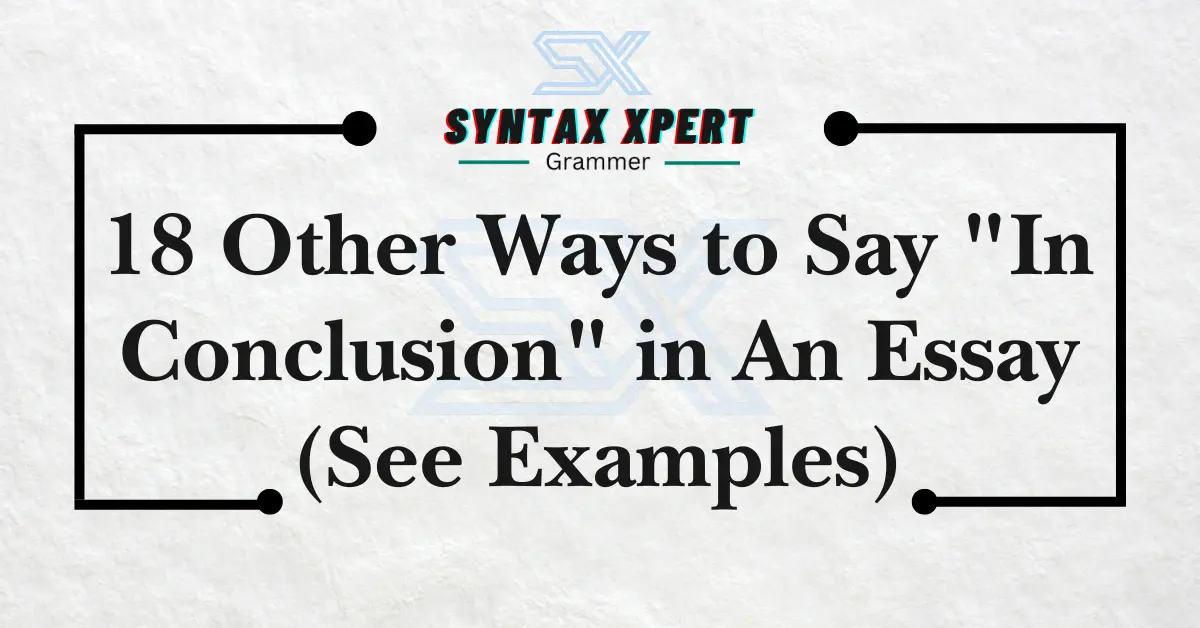In conclusion, every well-structured essay needs a powerful ending to reinforce key points. However, relying on the same phrase repeatedly can make your writing sound repetitive. Whether you’re working on academic writing, scholarly writing, or formal writing, varying your language improves readability and engagement.
If you’re wondering what to say instead of “in conclusion,” there are plenty of strong alternatives. Using in conclusion substitutes adds variety and professionalism to research writing and essay writing. Below, we’ll explore synonyms for “in conclusion” in an essay, complete with definitions and examples to help you craft a compelling final paragraph.
Alternative Ways to Say “In Conclusion” in an Essay
Here are 18 effective alternatives to “in conclusion” that can enhance your writing:
- To summarize
- In summary
- Ultimately
- All things considered
- In closing
- As a final point
- In the final analysis
- To wrap things up
- On the whole
- At the end of the day
- Long story short
- To recap
- With this in mind
- As has been demonstrated
- To sum up
- In a nutshell
- In the final analysis
- Overall
1. To Summarize
To summarize is a great way to briefly restate your main points without sounding redundant. It signals to the reader that you are wrapping up your ideas concisely while keeping the focus on key takeaways.
In academic composition, this phrase ensures clarity and precision. Instead of restating every detail, it provides a succinct overview, making your essay writing more impactful.
Email Example:
Subject: Summary of Project Discussion
Dear Linda,
To summarize, we agreed to finalize the proposal by Friday. John will handle the budget, and I will oversee the presentation. Let’s regroup on Thursday for final adjustments.
Best,
Mark
2. In Summary
In summary is another excellent choice for concluding an essay. It neatly encapsulates the discussion while reinforcing your final thoughts. This phrase is widely used in scholarly writing and ensures a smooth transition to the closing remarks.
Using in summary in formal writing helps maintain professionalism and structure. It allows the reader to quickly grasp the essence of your discussion.
Email Example:
Subject: Key Takeaways from Today’s Meeting
Dear James,
In summary, we will implement the new strategy starting next week. I will send out detailed instructions tomorrow, and you can follow up with the team.
Best regards,
Sarah
3. Ultimately
Ultimately is a versatile phrase that emphasizes the final outcome or conclusion of an argument. It signals that the discussion has reached its logical end and leaves the reader with a lasting impression.
In essay writing, this term adds weight to your final statement, ensuring that your conclusion is both strong and memorable.
Email Example:
Subject: Final Decision on Marketing Campaign
Hi Alex,
Ultimately, we have decided to proceed with the digital-first approach. The team will meet tomorrow to finalize execution details. Let me know if you have any concerns.
Best,
Emily
4. All Things Considered
All things considered suggests a thoughtful evaluation of the points discussed. It’s an effective way to conclude an essay by emphasizing that every angle has been taken into account.
This phrase works well in research writing, where a well-rounded perspective is crucial. It leaves readers with a sense of completeness and finality.
Email Example:
Subject: Decision on Venue Selection
Dear Martin,
All things considered, the conference hall on 5th Avenue meets our needs best. It offers the required capacity and AV setup. Let’s confirm the booking.
Regards,
Sophia
5. In Closing
In closing is a polished and professional phrase often used in formal writing. It effectively signals the conclusion while maintaining an authoritative tone.
This phrase is particularly useful in academic composition, helping to wrap up discussions smoothly while reinforcing key takeaways.
Email Example:
Subject: Final Thoughts on Budget Proposal
Hi Olivia,
In closing, our budget adjustments align with the project’s objectives. Please review the revised figures and share your feedback.
Best,
Daniel
6. As a Final Point
As a final point introduces the last remark in a structured and sophisticated manner. It is ideal for adding a concluding statement that leaves a strong impact.
This phrase is useful in academic writing where a compelling conclusion is necessary to reinforce findings and perspectives.
Email Example:
Subject: Last Note on Employee Training Program
Dear Kevin,
As a final point, ensuring proper onboarding will enhance productivity. Let’s discuss additional resources to streamline the process.
Sincerely,
Rachel
7. In the Final Analysis
In the final analysis is a refined way to summarize findings and draw a logical conclusion. It conveys a sense of evaluation and final judgment.
In scholarly writing, this phrase is particularly useful for essays that involve deep analysis and structured reasoning.
Email Example:
Subject: Evaluation of Marketing Strategies
Dear Julia,
In the final analysis, strategy B aligns best with our goals. It ensures long-term engagement and cost-effectiveness. Let’s move forward with implementation.
Best,
Chris
8. To Wrap Things Up
To wrap things up is a conversational yet effective phrase for concluding an essay. It provides a smooth transition to the final thoughts without sounding abrupt.
In formal writing, it can be used to maintain engagement while signaling that the discussion is coming to a close.
Email Example: Subject: Closing Thoughts on Project Timeline
Hi Samantha,
To wrap things up, we should finalize all deliverables by Friday. I’ll check in on progress tomorrow to ensure everything is on track.
Best,
Nathan
9. On the Whole
On the whole is a great way to conclude an essay by emphasizing the overall perspective. It suggests that all aspects have been weighed and a general conclusion has been drawn.
This phrase is highly effective in academic composition, where a holistic view is necessary to strengthen the final argument.
Email Example: Subject: General Assessment of Sales Performance
Dear Robert,
On the whole, this quarter’s sales exceeded expectations. We should build on this momentum for the next cycle. Let’s discuss further in tomorrow’s meeting.
Best,
Laura
10. At the End of the Day
At the end of the day conveys a final assessment of the points discussed. It suggests that after considering everything, a definitive conclusion is being drawn.
This phrase is useful in formal writing and academic composition when summing up an argument with a clear resolution. It works well when you want to emphasize the final takeaway from your discussion.
Email Example:
Subject: Final Decision on Budget Allocation
Hi Tom,
At the end of the day, allocating more funds to marketing will yield better returns. Let’s move forward with this strategy and adjust future budgets accordingly.
Best,
Lisa
11. Long Story Short
Long story short is a casual yet effective way to wrap up a discussion quickly. It’s best used in less formal essays or in academic writing where brevity is preferred.
This phrase keeps the conclusion direct and to the point. It is ideal when summarizing a long argument concisely.
Email Example:
Subject: Summary of Client Feedback
Hi Olivia,
Long story short, the client wants faster delivery and better customer service. Let’s work on solutions to meet their expectations.
Best,
Daniel
12. To Recap
To recap is another excellent phrase to signal a conclusion. It is particularly useful in academic writing when reviewing key points without repeating everything verbatim.
This phrase keeps the summary brief and structured, making it an effective alternative to “in conclusion” in essays.
Email Example:
Subject: Recap of Team Meeting
Hi James,
To recap, we are focusing on lead generation this quarter, with Jane handling outreach and Mark managing content. Let’s regroup next week for updates.
Best,
Anna
13. With This in Mind
With this in mind signals a transition into the final thoughts while emphasizing a connection between previous points and the conclusion.
This phrase is valuable in research writing and scholarly writing, where drawing logical connections is crucial. It leaves the reader with a meaningful final statement.
Email Example:
Subject: Next Steps for Website Redesign
Dear Emily,
With this in mind, we should prioritize UX improvements before launching the new site. Let’s schedule a meeting to finalize the details.
Best regards,
Michael
14. As Has Been Demonstrated
As has been demonstrated is an excellent choice for academic writing where a structured argument has been presented. It signals that evidence has been provided and the conclusion is based on facts.
This phrase is commonly used in formal writing when reinforcing a research-based argument.
Email Example:
Subject: Report on Market Trends
Hi Lucas,
As has been demonstrated, digital advertising yields the highest ROI. I recommend increasing our budget allocation for online campaigns.
Best,
Sophia
15. To Sum Up
To sum up is a clear and direct phrase that signals a final summary. It’s widely used in scholarly writing and academic composition where a structured conclusion is necessary.
This phrase works well when reinforcing main points without unnecessary repetition.
Email Example:
Subject: Final Thoughts on Software Update
Hi Jason,
To sum up, the latest version addresses all security concerns, improves performance, and enhances user experience. Let’s roll out the update by Friday.
Best,
Rachel
16. In a Nutshell
In a nutshell is an informal yet effective way to summarize your argument quickly. It’s best used in less formal essays or in instances where conciseness is key.
This phrase helps to wrap up key points in a digestible manner without losing impact.
Email Example:
Subject: Summary of Research Findings
Dear Ethan,
In a nutshell, our study confirms that remote work increases productivity by 20%. Let’s prepare a report for the leadership team.
Best,
Mia
17. In the Final Analysis
In the final analysis is a sophisticated phrase that conveys a thoughtful evaluation of all points discussed. It is frequently used in academic and research writing where conclusions must be carefully weighed.
This phrase adds a sense of depth and logical finality to the conclusion.
Email Example:
Subject: Evaluating Partnership Options
Hi Sarah,
In the final analysis, partnering with Company A offers better long-term benefits. Let’s proceed with negotiations.
Best,
Nick
18. Overall
Overall is a versatile phrase that effectively summarizes the main ideas and final assessment. It is widely used in academic writing, formal writing, and research writing.
This phrase ensures that the conclusion ties everything together smoothly while maintaining clarity.
Email Example:
Subject: Performance Review Summary
Hi Kevin,
Overall, our team exceeded expectations this quarter. We should celebrate the wins and focus on improving weak areas. Let’s discuss action steps in our next meeting.
Best,
Laura
Read More >>> 20 Other Ways to Say “Looking Forward To” (See Examples)
Frequently Asked Questions
What can I say instead of in conclusion?
You can use “to summarize,” “ultimately,” “in closing,” “on the whole,” or “in the final analysis” as effective alternatives to “in conclusion.”
What is another word for conclusion in an essay?
Other words for conclusion in an essay include “final thoughts,” “closing remarks,” “summary,” “wrap-up,” and “end result.”
How to conclude in a formal way?
In formal writing, you can conclude with “as a final point,” “in the final analysis,” “to summarize,” or “with this in mind.”
What else can I say instead of “in summary”?
Instead of “in summary,” use “to sum up,” “to recap,” “in a nutshell,” “overall,” or “to wrap things up.”
Conclusion
Choosing other words for “in conclusion” in an essay enhances clarity and variety in your writing. Instead of relying on a single phrase, incorporating alternatives to “in conclusion” improves readability and engagement. Each substitute carries a unique tone and impact, allowing for a more compelling final argument.
Whether you prefer in conclusion substitutes like “to summarize,” “ultimately,” or “all things considered,” selecting the right one depends on your context. By diversifying your vocabulary, your essay writing and research writing will appear more polished and professional. Next time you need a closing statement, try one of these synonyms for “in conclusion” in an essay to leave a lasting impression.

I’m Luna Hazel, a grammar expert here to help you master the art of clear, confident writing. Let’s make every word count!

